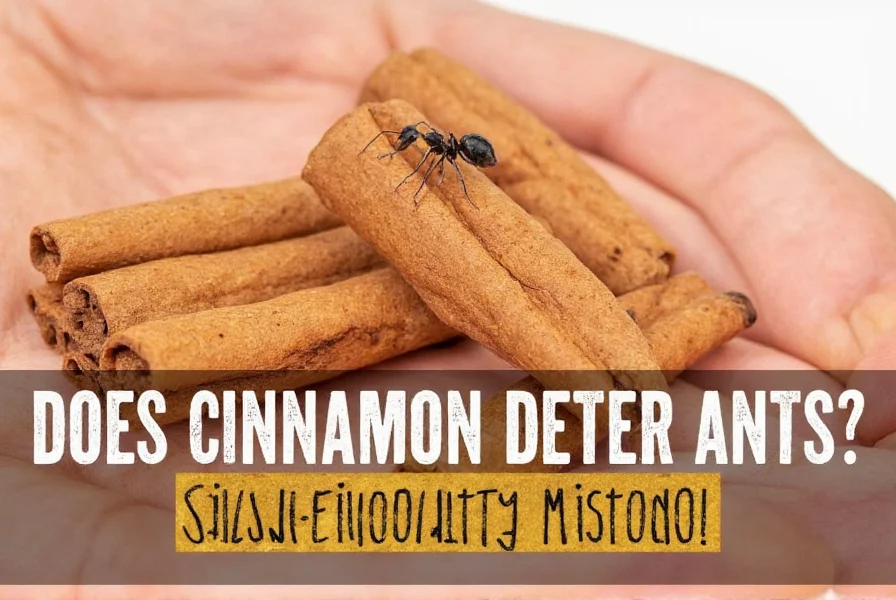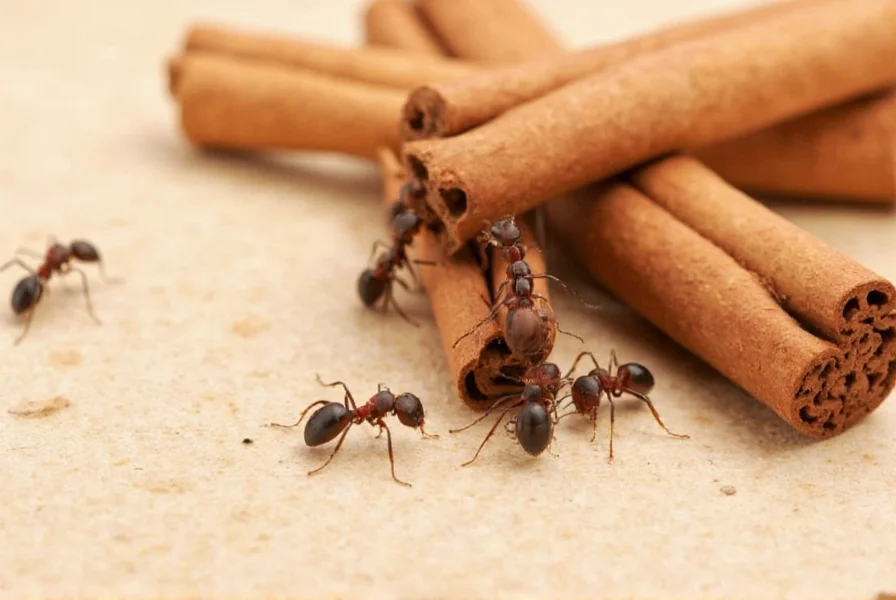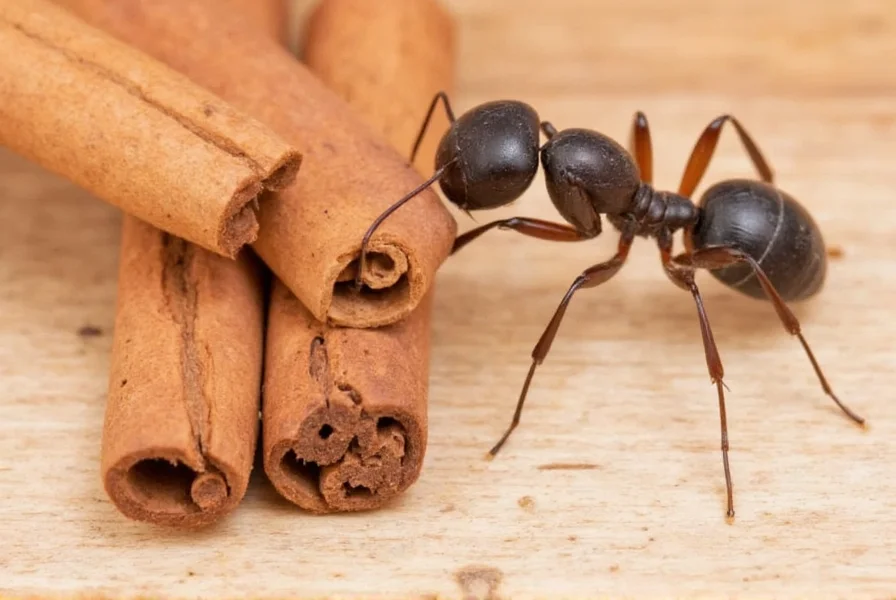Yes, cinnamon can deter ants effectively as a natural repellent. Scientific research shows that cinnamon's strong scent, particularly from compounds like cinnamaldehyde, disrupts ants' pheromone trails and confuses their navigation system. While it won't kill ants, it creates barriers they're reluctant to cross. Ground cinnamon works for short-term prevention, while cinnamon essential oil provides stronger, longer-lasting results. However, cinnamon is not a permanent solution for severe infestations and works best as part of an integrated pest management approach.
The Science Behind Cinnamon's Ant-Repelling Properties
Ants communicate primarily through chemical signals called pheromones. When worker ants find food, they lay down a pheromone trail for others to follow. Cinnamon contains volatile compounds, especially cinnamaldehyde (which makes up 60-90% of cinnamon bark oil), that interfere with ants' ability to detect these chemical trails.
A 2019 study published in the Journal of Economic Entomology demonstrated that cinnamon essential oil significantly reduced ant activity in laboratory settings. The research showed that concentrations as low as 0.5% disrupted trail-following behavior in multiple ant species, including common household invaders like Argentine ants and odorous house ants.
Unlike chemical pesticides, cinnamon doesn't kill ants—it simply creates barriers they prefer to avoid. This makes it an excellent choice for those seeking natural ant deterrent methods that are safe around children and pets.

Ground Cinnamon vs. Cinnamon Essential Oil: Which Works Better?
Not all cinnamon products work equally well for ant control with cinnamon. Understanding the differences can help you choose the most effective approach:
| Type | Effectiveness | Duration | Best Application Areas |
|---|---|---|---|
| Ground Cinnamon | Moderate | 1-3 days | Indoor entry points, kitchen surfaces |
| Cinnamon Essential Oil | High | 1-2 weeks | Outdoor perimeter, persistent problem areas |
| Cinnamon Stick | Low | Variable | Decorative deterrent, limited effectiveness |
Ground cinnamon creates a physical barrier that ants avoid crossing. Sprinkle it along baseboards, windowsills, and door thresholds where ants enter. The powder form works well for does ground cinnamon keep ants away scenarios but requires frequent reapplication, especially in high-traffic areas or after cleaning.
Cinnamon essential oil delivers more potent results. Mix 15-20 drops with 1 cup of water in a spray bottle for a homemade ant repellent with cinnamon. This solution works particularly well for outdoor application around your home's perimeter. The oil's concentrated compounds provide longer-lasting protection than powdered cinnamon alone.
Step-by-Step Application Guide for Maximum Effectiveness
To properly use cinnamon as an ant deterrent, follow these evidence-based methods:
- Clean affected areas first: Before applying cinnamon, clean surfaces with vinegar solution to remove existing ant pheromone trails
- Create continuous barriers: For ground cinnamon, apply a thick, unbroken line (⅛ inch wide) at entry points—ants won't cross continuous scent barriers
- Focus on entry points: Target windowsills, door thresholds, pipe entrances, and cracks in foundations
- Reapply after disturbances: Reapply ground cinnamon after cleaning or rain; reapply oil spray every 7-10 days
- Combine with other deterrents: For persistent problems, alternate cinnamon with other natural repellents like black pepper or coffee grounds
For severe infestations, create a cinnamon oil ant barrier by mixing 30 drops of cinnamon essential oil with 1 cup of water and 1 teaspoon of dish soap. The soap helps the solution adhere to surfaces longer. Spray this mixture around your home's perimeter, focusing on foundation cracks and potential entry points.

How Cinnamon Compares to Other Natural Ant Deterrents
While cinnamon works well, understanding how it stacks up against other natural options helps you choose the best approach for your situation:
- Vinegar solutions: Effective at disrupting trails but smell dissipates quickly (24-48 hours). Works better for immediate trail disruption than long-term prevention.
- Peppermint oil: Similar effectiveness to cinnamon oil but some ant species develop tolerance faster. The cinnamon vs peppermint for ant control debate shows cinnamon generally provides longer-lasting results.
- Coffee grounds: Moderate effectiveness but can attract other pests. Best used outdoors in garden areas.
- Lemon juice: Works temporarily but degrades quickly in sunlight. Better for indoor spot treatment.
A 2021 comparative study in Pest Management Science found that cinnamon oil maintained ant-repelling effectiveness for 14 days, outperforming peppermint oil (10 days) and vinegar solutions (3 days). This makes cinnamon one of the most durable natural options for how long does cinnamon keep ants away scenarios.
Limitations and When to Seek Professional Help
While cinnamon provides a safe, natural solution for minor ant problems, it has important limitations:
- Doesn't eliminate the colony—only deters foraging workers
- Less effective against certain species like carpenter ants
- Requires consistent reapplication, especially outdoors
- Won't solve infestations originating inside walls or foundations
Consider professional pest control if you notice:
- Ant trails persisting after 2 weeks of consistent cinnamon treatment
- Signs of structural damage (for carpenter ants)
- Ants nesting indoors (visible mounds or sawdust-like material)
- Numerous entry points throughout your home
Remember that cinnamon repels ants but doesn't kill them—this explains does cinnamon kill ants or just repel them. For complete eradication, you'll need to address the colony itself, which may require professional intervention for severe cases.
Safety Considerations for Home Use
One major advantage of cinnamon over chemical pesticides is its safety profile:
- Pet safety: Cinnamon is generally safe around dogs and cats in small amounts, but avoid concentrated essential oil near birds
- Child safety: Non-toxic when used as directed, though keep essential oil out of reach
- Surface compatibility: Ground cinnamon won't damage surfaces, but test oil solutions on inconspicuous areas first
- Allergies: Rare, but some individuals may experience skin irritation from direct contact with cinnamon oil
When using cinnamon oil for ant control, always dilute properly (1-2% concentration for indoor use) and avoid spraying near food preparation surfaces. For households with young children or pets, ground cinnamon barriers provide effective deterrence with minimal risk.
Practical Tips for Long-Term Ant Prevention
For the best results with cinnamon ant control, combine it with these preventive measures:
- Seal entry points with caulk (1/16 inch gaps can accommodate ants)
- Keep kitchen surfaces clean and store food in airtight containers
- Fix leaky pipes to eliminate water sources ants need
- Trim vegetation away from your home's exterior
- Use cinnamon barriers seasonally during peak ant activity (spring and fall)
Rotate between different natural deterrents every few weeks to prevent ants from adapting. This integrated approach addresses the question of how to use cinnamon to repel ants while creating a comprehensive defense against future invasions.
Frequently Asked Questions
Does cinnamon actually kill ants or just repel them?
Cinnamon primarily repels ants rather than killing them. The compounds in cinnamon, especially cinnamaldehyde, disrupt ants' pheromone trails and confuse their navigation system, causing them to avoid treated areas. While extremely high concentrations of cinnamon oil might kill some ants on direct contact, its primary function is as a deterrent, not an insecticide.
How long does cinnamon keep ants away?
Ground cinnamon typically deters ants for 1-3 days before needing reapplication, especially in high-traffic areas or after cleaning. Cinnamon essential oil solutions last longer—about 7-14 days depending on concentration and environmental factors. For best results, reapply ground cinnamon weekly and oil solutions every 7-10 days, or immediately after rain for outdoor applications.
Is cinnamon more effective than vinegar for keeping ants away?
Yes, research shows cinnamon is generally more effective than vinegar for long-term ant deterrence. While vinegar disrupts ant trails immediately, its effectiveness lasts only 24-48 hours as the smell dissipates quickly. Cinnamon, especially in essential oil form, maintains its repellent properties for 7-14 days. A 2021 study found cinnamon oil remained effective for 14 days compared to vinegar's 3-day effectiveness in controlled conditions.
Can I use cinnamon sticks instead of powder for ant control?
Cinnamon sticks have limited effectiveness for ant control compared to ground cinnamon or essential oil. While they release some scent, the concentration is too low to create an effective barrier. For meaningful results, you need the concentrated compounds found in ground cinnamon (which creates a physical barrier) or cinnamon essential oil (which provides higher concentrations of active compounds). If using sticks, crush them to release more oils, but ground cinnamon remains significantly more effective.
Will cinnamon work on all types of ants?
Cinnamon works effectively on most common household ants including Argentine ants, odorous house ants, and pavement ants. However, it's less effective against carpenter ants and fire ants, which may require stronger interventions. Effectiveness also varies by colony—some ant populations may adapt to cinnamon barriers over time. For best results, rotate between different natural deterrents like cinnamon, peppermint, and coffee grounds to prevent ants from becoming accustomed to any single repellent.











 浙公网安备
33010002000092号
浙公网安备
33010002000092号 浙B2-20120091-4
浙B2-20120091-4